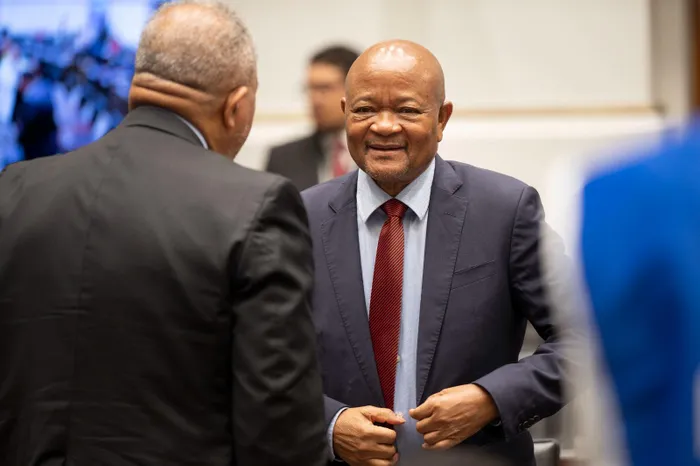
Senzo Mchunu told Parliament he withheld concerns from Masemola to protect whistleblowers in the PKTT, fearing retaliation and breaches of trust that could jeopardize investigations and officer safety.
Image: Amanda Hough/ Independent Newspapers
Suspended Police Minister Senzo Mchunu provided detailed insight into why he chose not to communicate directly with National Police Commissioner General Fannie Masemola regarding critical concerns about the Political Killings Task Team (PKTT).
In his testimony before Parliament’s Ad Hoc Committee probing police corruption on Thursday, Mchunu revealed that numerous members of the PKTT had privately contacted him with serious grievances about how the unit was being managed.
“Many members of the PKTT sent me messages asking to meet privately to raise issues with how it was being run,” he said.
Concerned about protecting the identities and safety of these officers, Mchunu explained he was reluctant to communicate these issues openly through conventional channels.
“I sensed something was wrong, and I wanted to protect the officers that approached me,” he told the committee.
He described the problems within the task team as involving sensitive human resource and operational issues that, if left unaddressed, could damage the integrity of investigations and undermine justice.
“The way they practice and handle matters has the potential — if not dealt with expeditiously — to damage the unit's reputation and ultimately defeat the ends of justice,” Mchunu said.
To address these challenges, he convened a meeting on November 21, 2024, with some individuals, during which they reviewed complaints and began mapping out solutions.
“We discussed issues, including personnel problems, and began allocating resources to address these problems. I convinced them of the importance of engaging the National Commissioner on these matters,” he said.
However, he stressed that engaging General Masemola took time to finalize the form and timing.
“Because we didn’t discuss the nature of that engagement in detail, I was left to determine how to proceed. It took some time before I was satisfied with the process,” Mchunu explained.
He emphasized that his hesitancy to communicate directly with the National Commissioner was not a lack of trust but a concern for safeguarding those who had confided in him.
“Due to their safety, I was influenced not to go to the National Commissioner. It had nothing to do with trust,” he said.
Mchunu detailed his process before issuing his directive dissolving the PKTT.
At the end of 2024, after reflecting on the unit’s progress and challenges, he concluded that performance still fell short of his expectations.
He described spending time in his rural hometown reflecting deeply before committing to the decision.
He added that he drafted the directive dissolving the PKTT on December 31, 2024, repudiating suggestions that others authored the letter or "people sitting in a corner."
“I sat alone and wrote that letter myself. It reflected my assessment of the work and the issues,” he said.
Mchunu also addressed efforts to ensure accountability and fairness for those officers who had raised complaints, including plans to establish a neutral inquiry mechanism to provide them with a safe platform to give evidence.
“I didn’t want to speak on their behalf. If they were lying to me, they would also lie to others. They must come and say these things live,” he told the committee.
Mchunu cited Section 206(1) of the Constitution as the legal and constitutional basis for the directive, which assigns the minister responsibility for determining national police policy after consulting with provinces.
He explained that his directives, issued within his constitutional powers, were designed to guide the National Commissioner in managing the police service.
“The Constitution clearly allows the minister to determine policy and give directions to the National Commissioner, who manages and controls the police service. My directives were issued in line with this responsibility,” Mchunu asserted.
He accepted full responsibility for the decision and emphasized the seriousness with which he approached it, aiming to improve policing outcomes and security for South Africans.
IOL Politics
Related Topics: